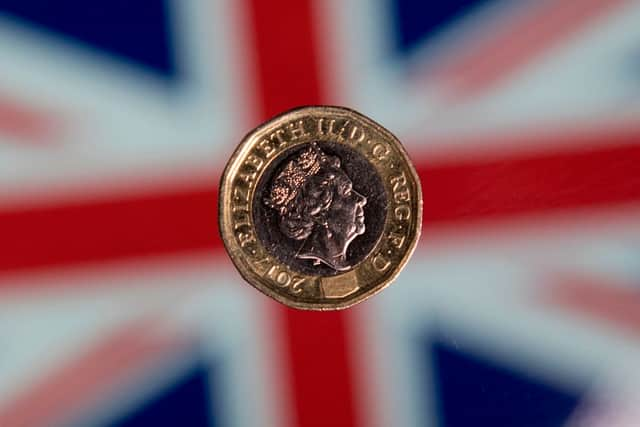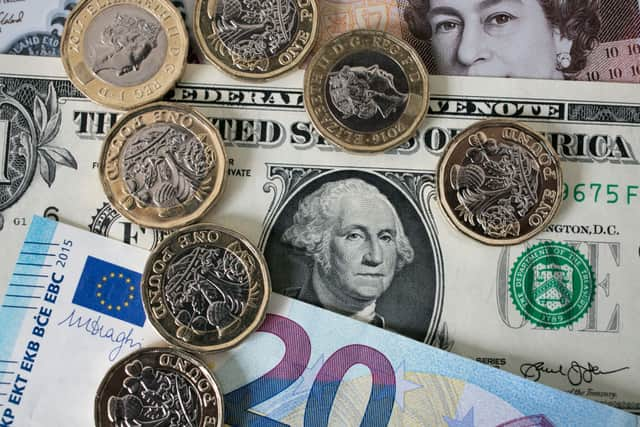Pound exchange rate: what does it mean for UK economy, will fall in GBP impact energy bills and petrol prices?
and live on Freeview channel 276
The value of the pound tanked against the dollar on Monday (26 September), as markets continued to react to Chancellor Kwasi Kwarteng’s mini budget.
Investors appear to be concerned that the tax cutting agenda of the Liz Truss government risks fuelling what is already record inflation. Meanwhile, fears about the prospect of a UK recession coupled with 14-year-high interest rates are also spooking traders.
Advertisement
Hide AdAdvertisement
Hide AdThe Bank Of England, which raised its base rate by 0.5 percentage points to 2.25% before the mini budget, is now expected to have to raise interest rates again in a bid to keep inflation down. An announcement from the UK central bank is expected imminently.
But what does the pound’s current exchange rate mean for the UK economy - and how will it affect you? Here’s what you need to know.


How much has the pound fallen by?
The pound had already hit six-year lows of $1.16 in the run up to Kwasi Kwarteng’s mini budget. But in the major fiscal event’s immediate aftermath, it fell to a 37-year low of $1.10.
On Monday (26 September), Asian markets recorded the pound’s lowest value against the dollar since decimalisation in 1971 - the time when the value of the pound was no longer tied to gold prices. The UK currency fell to just $1.03 before rallying as the day went on to $1.08.
Loading....
Advertisement
Hide AdAdvertisement
Hide AdTo put these figures into context, the pound has been worth more than $2.40 at some points since decimalisation. It has routinely been valued above $1.50 for much of the last 50 years.
However, since Brexit, the pound’s value has averaged out at around $1.30.
2022 had started relatively well for the value of the pound, with the currency sitting at $1.35. But it has been on a downward curve pretty much ever since as a result of the UK’s worsening economic outlook in the wake of the Russia-Ukraine war.
What does the pound’s exchange rate mean for UK economy?
The value of the pound has a major bearing on the UK economy. Not only does it determine the cost of key commodities, but it also acts as a yardstick of how well the UK economy is perceived by private sector investors.
Immediate economic impacts
Advertisement
Hide AdAdvertisement
Hide AdHow the pound shapes up against the US dollar is particularly important given the dollar is the world’s ‘primary reserve currency’ - i.e. the money financial institutions and economies use when doing international trade.
Its value compared to the euro is also important given the euro is the world’s de facto second currency, and also because much of the UK’s trade is conducted with countries in the Eurozone.


The dollar’s crucial role in world trade means it is used to set the price of vital goods and services. For example, the wholesale prices of oil and gas are set in dollars.
So, if the pound is doing well against the dollar, these prices will be cheaper. Likewise, if the pound is not doing well against the US currency, these commodities become more expensive.
Advertisement
Hide AdAdvertisement
Hide AdHowever, it should be noted that these impacts are felt in wholesale markets, and do not necessarily trickle down into consumer bills unless there is a sustained rise/fall in pound sterling.
Over the next two years, consumer energy bills will not feel the impact of a weak pound given the government has capped them through its energy price guarantee. Likewise, businesses will not be exposed for at least six months thanks to their own government support scheme.
But, in the long-run, the taxpayer is likely to face a higher bill as the government borrowing being used to fund them will have become more expensive.


A weak pound might also be felt soon at the petrol pump and on the supermarket shop should the pound continue to struggle.
Advertisement
Hide AdAdvertisement
Hide AdLikewise, the boss of pub and brewery chain Carlsberg Marston’s warned BBC Radio 4 Today programme listeners the price of a pint could rise as the British beer industry imports beer and hops from overseas. Mobile phones, clothing and furniture are other categories that are likely to be affected.
Where you will feel an immediate drop in the pound’s value is at the bureau de change. British holidaymakers will find their money will not go as far as it may have once done when they’re abroad.


Yardstick for UK economy
As well as determining the cost of things, the value of the pound is also a barometer for how the international private sector views the UK economy as a place to do business. When the pound is weak, as it is now, it tends to mean markets are not confident in the country’s economic outlook.
This does not mean investors are always right. But their lack of confidence can contribute to the headwinds the UK economy faces.
The main reasons for this lack of confidence include:
- Inflation rates: the UK has the worst inflation in the G7 group of countries and one of the worst rates in Europe. High inflation discourages consumer spending, thus making it harder to do business, and also erodes the value of the pound
- Interest rates: high inflation means interest rates - i.e. how much more it costs to borrow money - will be pushed higher to bring it under control and protect the value of the pound, slowing economic activity
- Kwasi Kwarteng’s mini budget: the Chancellor’s tax cutting has spawned fears inflation could be at record levels for a longer period. It means interest rates may have to be put up even higher
- Recession fears:recessions mean it is harder for businesses to make money. They will tend to cut back on spending and investment. Unemployment also tends to rise. The Bank of England says we’re already in a recession. Even if we’re not, we are forecast to be in one by the end of 2022.
Advertisement
Hide AdAdvertisement
Hide AdThe other reason behind the pound’s fall in value is the strength of the US economy. It has not been as badly hit by inflation and could still avoid a recession.
Also, as the dollar is the world’s primary reserve currency, it largely retains its value. It means it is a safer bet for the markets in times of economic uncertainty.
Comment Guidelines
National World encourages reader discussion on our stories. User feedback, insights and back-and-forth exchanges add a rich layer of context to reporting. Please review our Community Guidelines before commenting.
